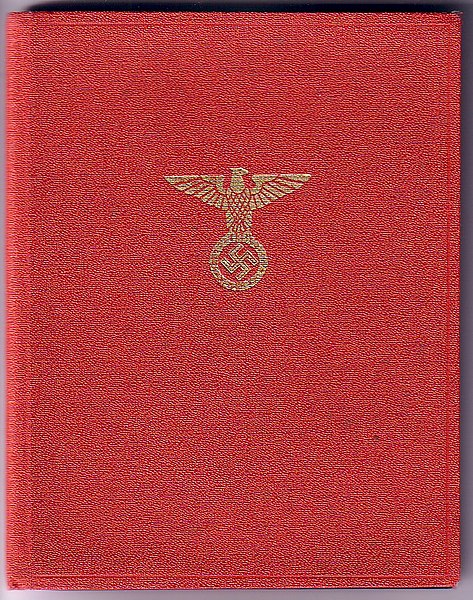Ernst Julius Günther Röhm was a German military officer and a leading member of the Nazi Party. Initially a close friend and early ally of Adolf Hitler, Röhm was the co-founder and leader of the Sturmabteilung (SA), the Nazi Party's original paramilitary wing, which played a significant role in Adolf Hitler's rise to power. He served as chief of the SA from 1931 until his murder in 1934 during the Night of the Long Knives.
Röhm as a Hauptmann (Captain) in 1924
Röhm, standing fifth from left, as member of "the staff of the Führer taken on the day of his appointment as Reich Chancellor" on 30 January 1933.
Defendants in the Beer Hall Putsch trial. From left to right: Pernet, Weber, Frick, Kriebel, Ludendorff, Hitler, Bruckner, Röhm, and Wagner.
Röhm with Adolf Hitler, August 1933
The Nazi Party, officially the National Socialist German Workers' Party, was a far-right political party in Germany active between 1920 and 1945 that created and supported the ideology of Nazism. Its precursor, the German Workers' Party, existed from 1919 to 1920. The Nazi Party emerged from the extremist German nationalist, racist and populist Freikorps paramilitary culture, which fought against communist uprisings in post–World War I Germany. The party was created to draw workers away from communism and into völkisch nationalism. Initially, Nazi political strategy focused on anti–big business, anti-bourgeois, and anti-capitalist rhetoric; it was later downplayed to gain the support of business leaders. By the 1930s, the party's main focus shifted to antisemitic and anti-Marxist themes. The party had little popular support until the Great Depression, when worsening living standards and widespread unemployment drove Germans into political extremism.
NSDAP membership book
Mein Kampf in its first edition cover
Nazis during the Beer Hall Putsch in Munich
Hitler with Nazi Party members in 1930








